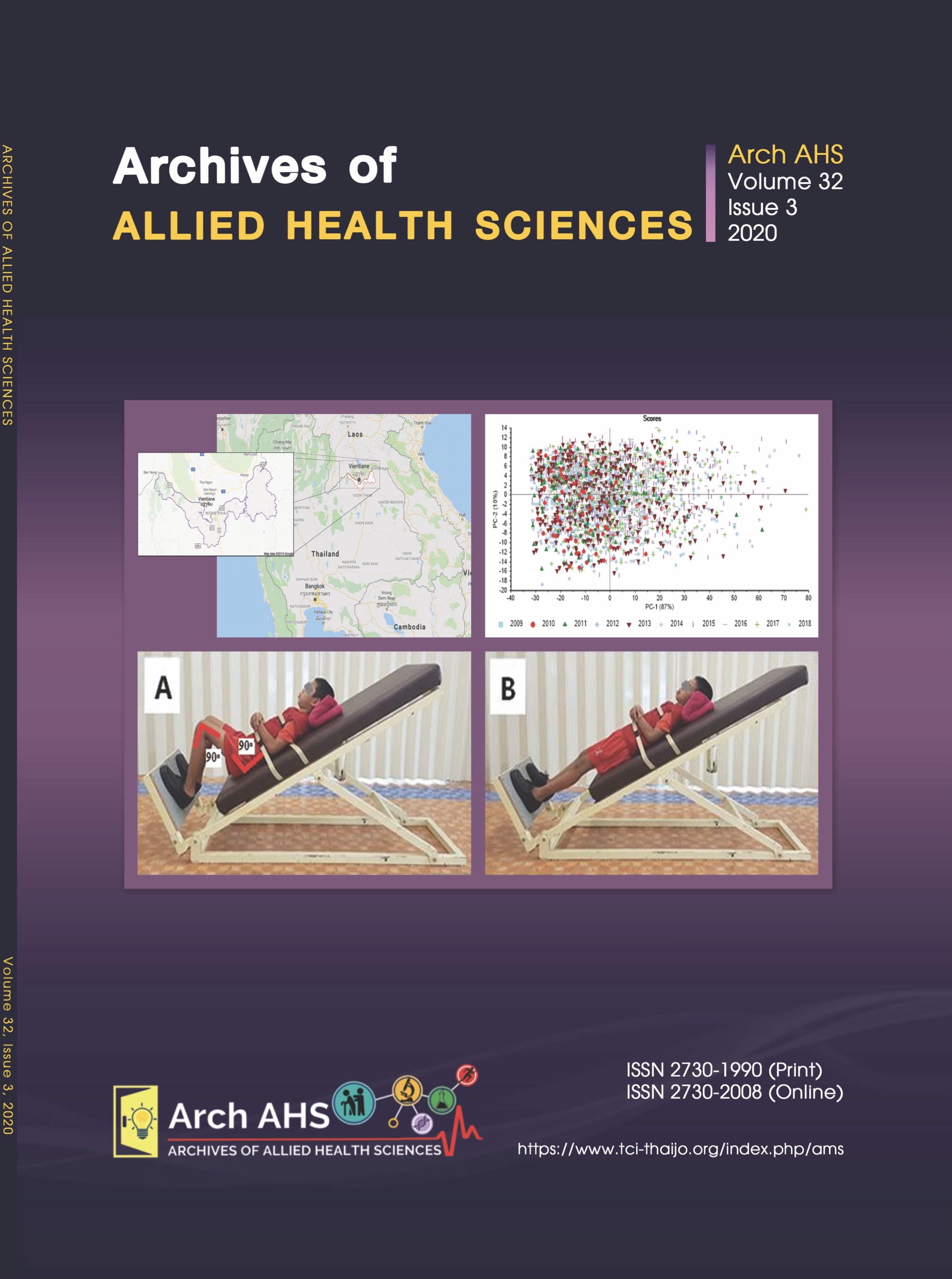Association of alpha fibrinogen -58G/A genetic polymorphisms with acute coronary syndrome in type 2 diabetes mellitus
Main Article Content
Abstract
Fibrinogen is one of the inflammatory markers and plays a crucial role in pathophysiological process of cardiovascular diseases (CVD). High levels of fibrinogen are associated with atherosclerosis progression and CVD complication in type 2 diabetes mellitus (DM). Furthermore, fibrinogen genetic polymorphisms are one of the important factors affecting their levels. Therefore, this study aimed to evaluate the associations of FGA -58G/A polymorphism with clinical manifestations of coronary artery disease (CAD) in type 2 DM. A case-control study included 123 documented DM patients presenting with either acute coronary syndrome (ACS) or stable CAD and 86 control individuals without DM and presenting none or less than 50% stenosis of coronary artery. All subjects were genotyped for the FGA -58G/A polymorphism by using polymerase chain reaction-restriction fragment length polymorphism technique. The results showed that AA genotype and A allele of the FGA -58G/A polymorphism were independently associated with DM [adjusted OR (95% CI) = 3.3 (1.2, 8.9) and 3.3 (1.6, 6.6), respectively]. Moreover, the AA genotype and A allele were also significantly associated with ACS in diabetic patients [adjusted OR (95% CI) = 3.9 (1.3, 11.7) and 2.0 (1.2, 3.5), respectively], while the association with stable CAD was not observed. In conclusion, the results of this study may indicate the association of the FGA -58G/A polymorphism with the atherosclerotic progression which may in turn leads to the severe clinical manifestation of CAD in DM.
Article Details

This work is licensed under a Creative Commons Attribution-NonCommercial-NoDerivatives 4.0 International License.
References
References
Kannel WB, McGee DL. Diabetes and cardiovascular risk factors: the Framingham study. Circulation 1979; 59: 8-13.
Hadi HAR, Carr CS, Al Suwaidi J. Endothelial dysfunction: cardiovascular risk factors, therapy, and outcome. Vasc Health Risk Manag 2005; 1: 183-98.
Madjid M, Willerson JT. Inflammatory markers in coronary heart disease. Br Med Bull 2011; 100: 23-38.
Sjoholm A, Nystrom T. Inflammation and the etiology of type 2 diabetes. Diabetes-Metab Res 2006; 22: 4-10.
Ross R. Atherosclerosis--an inflammatory disease. N Engl J Med 1999; 340: 115-26.
Bruno G, Cavallo-Perin P, Bargero G, Borra M, D'Errico N, Pagano G. Association of fibrinogen with glycemic control and albumin excretion rate in patients with non-insulin-dependent diabetes mellitus. Ann Intern Med 1996; 125: 653-7.
Kattula S, Byrnes JR, Wolberg AS. Fibrinogen and fibrin in hemostasis and thrombosis. Arterioscler Thromb Vasc Biol 2017; 37: e13-21.
Mahendra JV, Kumar SD, Anuradha TS, Talikoti P, Nagaraj RS, Vishali V. Plasma fibrinogen in type 2 diabetic patients with metabolic syndrome and its relation with ischemic heart disease (IHD) and retinopathy. J Clin Diagn Res 2015; 9: BC18-21.
Shankar A, Wang JJ, Rochtchina E, Mitchell P. Positive association between plasma fibrinogen level and incident hypertension among men: population-based cohort study. Hypertension 2006; 48: 1043-9.
Jacquemin B, Antoniades C, Nyberg F, Plana E, Muller M, Greven S, et al. Common genetic polymorphisms and haplotypes of fibrinogen alpha, beta, and gamma chains affect fibrinogen levels and the response to proinflammatory stimulation in myocardial infarction survivors: the AIRGENE study. J Am Coll Cardiol 2008; 52: 941-52.
Hwang J-Y, Ryu M-H, Go M, Oh B, Shin Cho Y. Association between single nucleotide polymorphisms of the fibrinogen alpha chain (FGA) gene and type 2 diabetes mellitus in the korean population. Genomics Inform 2009; 7: 57-64.
Thygesen K, Alpert JS, Jaffe AS, Chaitman BR, Bax JJ, Morrow DA, et al. Fourth universal definition of myocardial infarction. Circulation 2018; 138: e618–51.
National Cholesterol Education P. ATP III guidelines at-a-glance quick desk reference: [Bethesda, Md.] : [National Institutes of Health, National Heart, Lung, and Blood Institute], [2001]; 2001.
Whitworth JA. 2003 World Health Organization (WHO)/International Society of Hypertension (ISH) statement on management of hypertension. J Hypertens 2003; 21: 1983-92.
World Health Organization (WHO). Definition and diagnosis of diabetes mellitus and intermediate hyperglycemia: Report of a WHO/IDF consultation. Geneva: the WHO Document Production Services; 2006.
Alberti KG, Eckel RH, Grundy SM, Zimmet PZ, Cleeman JI, Donato KA, et al. Harmonizing the metabolic syndrome: a joint interim statement of the international diabetes federation task force on epidemiology and prevention; national heart, lung, and blood institute; american heart association; world heart federation; international atherosclerosis society; and international association for the study of obesity. Circulation 2009; 120: 1640-5.
Kamath S, Lip GYH. Fibrinogen: biochemistry, epidemiology and determinants. QJM-INT J MED 2003; 96: 711-29.
Wang J, Tan G-J, Han L-N, Bai Y-Y, He M, Liu H-B. Novel biomarkers for cardiovascular risk prediction. J Geriatr Cardiol 2017; 14: 135-50.
Bembde AS. A study of plasma fibrinogen level in type-2 diabetes mellitus and its relation to glycemic control. Indian J Hematol Blood Transfus 2012; 28: 105-8.
Smith EB, Thompson WD, Crosbie L, Stirk CM. Fibrinogen/fibrin in atherogenesis. Eur J Epidemiol 1992; 8: 83-7.
Ban HJ, Heo JY, Oh KS, Park KJ. Identification of type 2 diabetes-associated combination of SNPs using support vector machine. BMC Genet 2010; 11: 26-7.
Shin HD, Park BL, Kim LH, Jung HS, Cho YM, Moon MK, et al. Genetic polymorphisms in peroxisome proliferator-activated receptor delta associated with obesity. Diabetes 2004; 53: 847-51.
Manolio TA, Cushman M, Gottdiener JS, Dobs A, Kuller LH, Kronmal RA. Predictors of falling cholesterol levels in older adults: the Cardiovascular Health Study. Ann Epidemiol 2004; 14: 325-31.
Sakkinen PA, Wahl P, Cushman M, Lewis MR, Tracy RP. Clustering of procoagulation, inflammation, and fibrinolysis variables with metabolic factors in insulin resistance syndrome. Am J Epidemiol 2000; 152: 897-907.
Smith EB. Fibrin deposition and fibrin degradation products in atherosclerotic plaques. Thromb Res 1994; 75: 329-35.
Mannila MN, Eriksson P, Ericsson CG, Hamsten A, Silveira A. Epistatic and pleiotropic effects of polymorphisms in the fibrinogen and coagulation factor XIII genes on plasma fibrinogen concentration, fibrin gel structure and risk of myocardial infarction. Thromb Haemost 2006; 95: 420-7.


